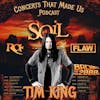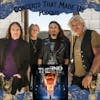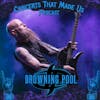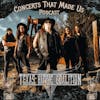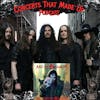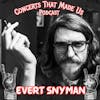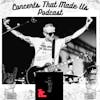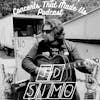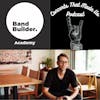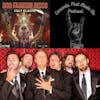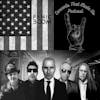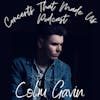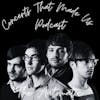Ron "Bumblefoot" Thal's Rockin' Revelations: Art of Anarchy, Guns n Roses Concert Memories and More!!
In this exciting podcast episode, Brian delves deep into the world of rock music by interviewing renowned guitar god Ron "Bumblefoot" Thal, known for his incredible talent and his time playing with the iconic rock bands such as Guns N' Roses, Asia, Sons of Apollo and Art of Anarchy.
As the conversation unfolds, listeners are treated to a wealth of fascinating details about Art of Anarchy's latest release, "Vilified," and the inspiration behind its creation. Bumblefoot passionately shares the emotional journey that led to the birth of this powerful song, giving fans a glimpse into the raw and authentic creative process.
But the discussion doesn't stop there. Brian also explores the exciting developments within Art of Anarchy, as Bumblefoot reveals the addition of vocalist Jeff Scott Soto (former Yngwie Malmsteen / Sons Of Apollo) and bassist Tony Dickinson (SOTO / Trans-Siberian Orchestra) and the impact they have had on the group's dynamic. With their upcoming album on the horizon, Bumblefoot provides an exclusive sneak peek into what fans can expect, teasing the evolution of their sound and the thrilling experimentation that awaits.
Beyond the music, Bumblefoot opens up about his personal experiences on the road, recounting memorable moments from touring and the challenges of promoting their music to a wider audience. He reflects on the thrill of performing live and the unique connection he feels with the audience and also shares anecdotes about his time playing with Guns N' Roses. In a heartwarming twist, he shares touching anecdotes about finding balance in life, emphasizing the importance of maintaining a sense of self amidst the chaos of the music industry. Listeners are treated to intimate stories of Bumblefoot's early musical influences, revealing the profound impact they had on shaping his unique style and sound.
But Bumblefoot's passion extends far beyond his own music. He speaks passionately about his involvement in charity events, highlighting the significance of using his platform to make a positive impact in the world. The guitarist shares heartwarming stories of playing shows that serve a greater purpose, where the power of music is harnessed to bring joy and hope to those in need.
Looking to the future, Bumblefoot tantalizes fans with his plans for upcoming releases. He hints at a solo instrumental album, promising a mesmerizing showcase of his virtuoso guitar skills. He also expresses his passion for producing other artists, highlighting his desire to help nurture and develop emerging talent.
In this captivating podcast episode, Ron "Bumblefoot" Thal's infectious enthusiasm and genuine love for music shine through. Through his insightful anecdotes, personal stories, and exciting plans for the future, listeners are taken on a thrilling journey into the world of Bumblefoot and beyond.
Songs included in this episode:
Vilified - Art of Anarchy
Planetary Lockdown - Ron "Bumblefoot" Thal
Find Bumblefoot here:
http://www.bumblefoot.com/index.php
Find Art of Anarchy here:
https://www.facebook.com/ArtOfAnarchyBand
https://www.instagram.com/artofanarchyband/
Vilified Music Video - https://youtu.be/E0YsFetchXQ?si=BghOkuRl0yy7F8Ne
Find CTMU here:
https://linktr.ee/Concertsthatmadeus
Newsletter: https://concertsthatmadeus.aweb.page/p/f065707b-2e34-4268-8e73-94f12bd2e938
Save 10% on Band Builder Academy membership by following this link https://bandbuilderacademy.com/Brian_Concerts/join and using promo code "concerts" at signup.
Become a member at https://plus.acast.com/s/concerts-that-made-us.
Hosted on Acast. See acast.com/privacy for more information.
Brian (00:00:00) - Ron Bumblefoot Thal, you're very welcome to Concerts That Made Us, it's an absolute honor and privilege to have you.
Bumblefoot (00:00:07) - Oh, it's my pleasure. Thank you so much for having me. Yes. Yes. We have plenty to talk about.
Brian (00:00:11) - We certainly do. I'm really looking forward to diving into it now. So Art of Anarchy released, vilified on the 15th of September. It's a kind of a dark song. Can you tell us where the inspiration came from?
Bumblefoot (00:00:23) - Oh, it's dark. What happened was in 2019, John Votta and his brother Vince, they're twin brothers, they've been playing together all their lives. And I've known them since they were teenagers, and I used to record them at my studio back then. So I've known them like over 25 years and band just sort of fell into place from that. John was stricken with some sort of mystery illness and the doctors couldn't diagnose what it was. But like his whole body, everything was shutting down. Oh, my God. Slowly, over the course of months, he was slowly dying and they couldn't figure it out.
Bumblefoot (00:01:02) - And all he could really do is just lie in bed with his guitar, watching movies. He had no energy. And, you know, the pretty dark time for him. And he would watch the Joker movie over and over and that just sort of that movie grabbed him, just kept his mind off everything. And he would just watch the movie while playing guitar and. You know, after doing that over and over. Start coming up with the same guitar parts for the same parts in the movie. Next thing you know, it's almost like you're playing songs that you've written for the movie to the movie. And that became the song, vilified the stuff he was playing. Eventually, the doctors figured it out and they gave him some strong treatment and he slowly came back and he was okay. So by mid 2020, he would come over and him and Vince, they would come over and they wanted to record that song. So they did. And every Friday, every week for about half a year they would come over and we would just record another song, just the music to a song.
Bumblefoot (00:02:09) - It would be drums, guitar, and I would throw in guitar parts. So the very first thing was the song vilified, and that's sort of what brought the band back. And because it was just such a personal thing for him. We released that song first as the single and recorded it on the same Joker stairs where the movie was filmed at Long Staircase in New York City in the Bronx. And so it's a dark song because he was dying as he wrote it, and just as a tribute to coming back from the Dead and the band kind of did as well. So that's the story behind the song. And there's a lot of interesting little things that people may not realize about the song, the narrations, where you hear like the news broadcaster talking about everything that is Jeff Tate doing that. Oh.
Brian (00:03:06) - Yeah.
Bumblefoot (00:03:07) - Now listen again, and you'll be like, Oh my God. It's like, you know, it sounds like the old Operation mine crime stuff. Yeah, yeah, yeah. Jeff Tate did all of that.
Brian (00:03:16) - And, you know, you guys have entered somewhat of a renaissance now. You've now got Jeff Scott sorta and Tawny Dickinson in the band. What was it like? What was the search like for new members and how did you land the guys?
Bumblefoot (00:03:29) - That was an easy one. I've already been in a band with Jeff, the singer in Sons of Apollo for years and were very close with great friends. So all the time he saw a lot of the challenges that Art of Anarchy had. And he would always say, You know, you should have just asked me to sing. It would have been smooth and easy. And I told him that we were writing stuff and and he said it again. He's like, Well, if you need a singer, I would love to do it. And I mentioned it to John and Vince and immediately, like, of course we would love to have them. We're big fans. And you know, he and I are tight, so it's just, you know, extended family coming together.
Bumblefoot (00:04:10) - So that was easy. It was as simple as Jeff just saying he, you know, like he'd like to do it. So we said, Yeah, you're in hell. Is that And our bass player, Jon Moyer, that was in the band up till then, he was not going to continue with the band, so. Jeff suggested. Like what about my bass player Tony, that I play with in Soto? And we're both in Trans-Siberian Orchestra and and Tony. Phenomenal. He's funny guy, great player. So, yeah, he's in. It's that simple. Just somebody wants to do it. It's like, Sure, you're in. And there we were. So as we would write songs, we would send to Jeff and like write the music to it, and, and he would write lyrics to the music or write melodies. And then he would just write his part to the music. And he liked to write after the music was done, which I always found interesting because a lot of times you would think that everybody wants to build the song at the same time, and as you write a part to the song, comes up with a melody that might spark an idea for the other person writing that, Oh, you know what? Why don't we take that and then we'll double up that melody and I'll do it on guitar and we'll do this.
Bumblefoot (00:05:22) - And but Jeff likes to wait until the music is just finished, and then you give it to him and he just absorbs it and gets a vibe for the song and ideas and what it should be about. And it comes to him. And that's the way he he operates. Yeah, So he's done that with Sons of Apollo. He does that with this. That's the way he likes to write. Yeah.
Brian (00:05:46) - I like it. I like it. I have to ask now. It's kind of an obvious question, I suppose, but being in Sons of Apollo with him and no art of anarchy, how do you keep it separate? You know, how do you stop the two from sounding too much alike? Oh, well.
Bumblefoot (00:06:00) - With any band, you know, every member is a key ingredient. And once you change those ingredients, it's not going to be exactly the same. So having Jon Votto, who has and Vince both have very old school Metallica, Megadeth and Kiss, like that's their loves and that shows up in their writing.
Bumblefoot (00:06:22) - So there's a lot of that there. So the foundation of the music has a lot of that and we're almost like just adding icing in a way. That's how I look at look at it like I'm just adding icing. I mean, I write stuff for the band too, but I feel like like they are the cake and I'm the icing and Jeff is the icing. And even though that's sort of underplaying our role, it's just that that at least in answering this question, I would say that the cake is, is more metal roots, more kind of sound where Sons of Apollo that I, Derrick and I write all the music and. It's more progressive. So coming up with crazy ideas like challenging ourselves technically and just brain wise and Derek has a totally different vibe, you know, he's very, you know, 70s keys and things like that. And in that band I tend to write more along the lines of Sugar Pantera type line. I tap into that part of things and, and that comes together.
Bumblefoot (00:07:40) - So different ingredients and different sides of the writers. Yeah yeah. True, true.
Brian (00:07:46) - And you guys are releasing an album in 2024. What can we expect? Can you tell us much about it at this stage?
Bumblefoot (00:07:52) - I'll be mid-February 2024 and it'll be similar to Vilified. I mean, there's, you know, faster songs, slower songs, heavier songs. There's some nice production stuff on it, some orchestration. Yeah, it'll be. Similar, I guess you could say similar to vilified. Definitely. It's not like that song is separate from the rest in any way. It's all in that direction. Yeah, right.
Brian (00:08:22) - And I have to ask now, you guys kind of have a turbulent history when it comes to promoting and touring after album releases. Do you feel like you finally found the right mix?
Bumblefoot (00:08:33) - Yes. Yes. It definitely it's a great team. Now between all the band members being on board and the label Pavement are fantastic. We have a great booking agent that is looking at, you know, touring opportunities.
Bumblefoot (00:08:51) - 324 Hopefully things can happen for that. I'm sure it will. You've got a band wants to get out and play. If anything, I'm the one who least to get out and play because I'm just at a different point in life where I feel like I don't want to be on the field anymore. I won't be the coach and I love producing and helping other bands do what we do. I love producing and helping other bands and making my own music, but I'm I'm looking to be less of an absentee of my family and everything. But that said, know ready to get out and play with the band So yeah.
Brian (00:09:32) - All right. Is that kind of like an admission that this may be the last couple of years we'll see you touring?
Bumblefoot (00:09:38) - No, I'll probably die on stage at a very ripe old age. I don't know. Or maybe not, but, yeah, it's. Yeah, but let's put it this way. My favorite thing is producing and studio stuff, being creative and collaborating with bands and especially younger artists and helping them get their shit together musically.
Bumblefoot (00:10:03) - And that's what I love. And teaching is what. My least favorite. I will say it out of everything. It's not saying that I hate it. It's just that I love everything so much more is. Touring? Absolutely. So if you had to go through the spectrum of everything that, you know, that is between handling business stuff and negotiating agreements and and being the band, etcetera, and psychologist and being the person who writes and being one who records and being the performer in so many branches to the tree. Definitely my favorite branches. Yeah, Yeah.
Brian (00:10:49) - Weirdo. I hear a lot of people saying that they look forward to touring because it's the most fun part. It's kind of it's funny what, maybe 54.
Bumblefoot (00:10:57) - Years old now and I'm feeling every bump and everything.
Brian (00:11:02) - And I was going to say 20, 20 years ago.
Bumblefoot (00:11:06) - Yeah, it was definitely it was more exciting because new. But once you've done it for decades and you see all the things you've missed in life because it is a trade off, you're giving up your life to perform for everybody.
Bumblefoot (00:11:19) - You're giving up your stability. You're just, you know, just waking up in your bed with your family and seeing each other and just being there, being there when the water blows and calling the plumber rather than other people having to do it for you and dealing with all that crap. Because very often when you're on tour, it seems like maybe takes just a week and your whole world you've left behind is starting to unravel without you there. Just that's when shit happens while you're gone. So. And also it's just for the brain. It's good to have the stability of just waking up in the same place, the same time. You go to the gym, you breakfast, you do everything, and having that stability keeps you stable. Yeah, yeah, it really does. So it is. I mean, I'll be honest about it. It's those are the challenges with touring. If you're going to live on the road, you're basically living out of a suitcase and you have a home and a family you don't see, and you slowly disconnect from all of that part of you, and you just live in these 24 hour increments just being there for everyone.
Bumblefoot (00:12:37) - And it just feels sort of soldier like where you have your duty and that's what you are, that is your purpose and that is what you do. And it's very easy for the rest of your life to wither. Yeah. Yeah. True. Yeah. So in my 50s now I have a different perspective on it and I feel like I have more of a duty to myself as well. And I need to be part of that equation. And it really hit me during the pandemic, which for a lot of people that time, you know, away from what you normally do was a big time for people to to reflect and reevaluate having the time to do that and just being off that runaway hamster wheel. So what really made it just hit hard is this place I'm in right now, this studio, this is a house I've had like a house for like 20 years that I used to make noise just to record and to do all my own stuff and to teach and to do that. Just everything. Music.
Bumblefoot (00:13:45) - And I didn't realize until 2020 that every July and August, the entire perimeter of the backyard, a big backyard that I have here, grows all of these berries, these blackberries and raspberries. And I had no idea I had the place for 17, 18 years. And I didn't even realize that happened because I was never here to say it. And I would come here every morning and I would spend like 45 minutes in the sun just quietly picking berries. And then when I would leave in the evening, I'd spend like another 45 minutes. More of them sprouted even just in that time, just tons of berries and just pick them and just having all these taters of berries that I would take home and my wife would make all kinds of desserts and things with them and we would eat them. And it just made me realize how much of lightest yeah. And didn't even know was there. So now it's like this thing to me. To me, I am here to pick the berries. And make sure that every year I don't miss that.
Bumblefoot (00:14:59) - It's just symbolic in a way.
Brian (00:15:01) - To.
Bumblefoot (00:15:02) - Need to find balance or just the simple beauties of life are going to pass by. And I'm not going against them.
Brian (00:15:12) - Yeah, it's funny, though. I was just going to say it was symbolic. Symbolic? It's like the simplest thing makes you realize, you know, it's crazy. Crazy. And I suppose at this stage we'll dive a bit into your history to give the listeners some insights that maybe they might not have got before. So if you can know, it's a bit odd or a bit tough, but what is your earliest musical memory?
Bumblefoot (00:15:37) - Oh, okay. I had just moved from. In New York City, the boroughs. I lived in Brooklyn and at five years old I moved to the next borough over Staten Island, which was very different. It was more woodsy and and deer and rabbits and and parks. And there were a lot of kids on the street that were my age. And we all had older brothers and sisters a few years older.
Bumblefoot (00:16:05) - So I would go over and play with my friends and there would be albums, just vinyl all over the floor that their parents had that their older brothers and sisters got. And I was exposed at five to just all these beautiful pieces of art and the curiosity of just what they were and just seeing these strange things and. I remember one time I would always go and we would we would go up to to their room and just put something on the turntable and just stare at the speakers like we're watching TV and just listen with our eyes and ears and everything and just get out all these bands and, and, you know, that was life for years of just discovering all this stuff, all these this classic rock and punk as it was just emerging. And yeah, so one time we put on this strange looking album with these guys with painted faces on them, and it was like, What is this? And it was The Kiss, a live album that just came out. And I was it was right before I was turning six years old and put it on.
Bumblefoot (00:17:16) - And just hearing the audience and Paul Stanley screaming, How do you all feel and everything? When I heard that. It just did something. I mean, before that, I was a big fan of the Beatles and everything else, especially the Beatles. But when I heard that, it made me. Want to be there and it made me want to do that. It was like there was something subliminal in it that when I heard that album just at five years old, I said, That's what I want to do. I want to be screaming on stage, making this kind of sound, emitting this kind of energy and getting it back from the crowd. And this is how I want to live. This is what I want to do. And from that moment I started pursuing it. I borrowed a guitar from a neighbor. I didn't know how to play it. I would lay it on my lap and strum it and smack the neck like it was a drum. And someone showed me, No, you put up this way.
Bumblefoot (00:18:10) - And I'm like, That makes no sense. You can't even see the strings when it's that way. And then reaching your arm over. Actually, if you think about it, it makes more sense to lie it on your lap. It does, yeah. But yeah. And show me like here's a pic, use the pointy end. And from there I started writing songs. I had nothing to write about. I'm like just turning six years old. I have no life experiences, you know, maybe, you know, a pretty girl in school or really my biggest interest at the time was astronomy, like astronomy and astrophysics and cosmology and space. I was fascinated by it. So the first song I wrote was called Jupiter is Nice, and I had no building blocks musically to draw from, so it's not like I had anything that I could really create with yet other than just stealing what I heard on the radio. So I would write songs that just sounded like things I heard on the radio. So the song Fox on the Run from Sweet and.
Bumblefoot (00:19:13) - Just.
Bumblefoot (00:19:13) - Copied the chords and and the melody is just like, Jupiter is nice.
Bumblefoot (00:19:20) - Take my advice. I stayed on the ice.
Bumblefoot (00:19:25) - And made verses all about the planet Jupiter and would.
Bumblefoot (00:19:29) - Just.
Bumblefoot (00:19:31) - Write about that and eventually, you know, had a band. My brother was playing drums and neighbor was playing guitar. We all wrote songs together. We figured out how to do multitrack recording by putting a recorder in the corner of the room. The drums would be farther back because they were louder. We would have our little nylon string acoustic guitars, so we'd get up close because they were quieter and that's how we got levels. And then we had our music recorded. We would take that and we would press play. On what we just recorded, have a second cassette recorder recording just like two inches away, facing it so that it would capture what we just played and we would put our face next to it and sing. So now we're overdubbing. We have our music on this one playing, we're singing Live It, and this one is recording both.
Bumblefoot (00:20:14) - So now we just overdubbed our vocals onto this one, and then when we needed to make copies, we were just press play on this one and record on this one and just like just let go. And that's how we made copies of Demo. And we just everything that a band does, we would play concerts in our backyard and at the school down the street and make little tickets and would cut up on show Day would spend all day just with paper and scissors, just making coffee and putting them into cups that I would hand out to the audience so that when it's the last song, I would tell them when and everyone would throw confetti in the air. We were doing everything just a kid version, using just what a kid has, you know, at his disposal to do what idols were doing. And all the time it developed and and it got better. And I remember the first time playing with Guns N Roses, playing Madison Square Garden, which, you know, we're going to talk about concerts and everything, playing Madison Square Garden in New York.
Bumblefoot (00:21:20) - That was the place I saw my first concert, which was Kiss and being on that same stage. Then at the end of the show, shooting these confetti cannons that would shoot confetti into the air, into the crowd, laughing to myself, saying, I'm glad I didn't have to cut up that confetti and just thinking about how it evolved over the course of like 30 years of being a little kid. Cutting down confetti for his own little cups in the backyard and building up to playing stage where I saw that band that hired me and saw my first concert to being on the stage and having the confetti shooting. And it was full circle. Yeah. And it just goes to show, stick with it, keep at it. Always just give it your best and just keep trying to grow and be better. And then the universe decides what happens from there. Yeah, yeah, yeah, exactly.
Brian (00:22:21) - Exactly. Now, your first concert was Kiss. What? If you think about all the concerts you've attended? What ones would you say have made you?
Bumblefoot (00:22:30) - Concerts that made me well, truly, that first really did.
Bumblefoot (00:22:35) - I mean, I remember the heat from the big flames on the stage. My face feeling hot like you just opened an oven and stuck your face near it. The opening act confused. I was. I didn't know that they were opening bands. I was a little kid. I saw them. It was the Dynasty tour in 1979 and I wanted to go to an earlier one, but I was too young. My parents wouldn't let me go. So that one and I remember this band came on and there was a keyboard player and I was like so confused. I was like, Where's the makeup? Where's where's this? You know, where's. Yeah, what's going on here? Wait, there's a keyboard player. What is this? We've been scammed. This isn't Kiss, I think. No, no. That's the opening act. And it was a band called New England. Phenomenal band. And their songs were so good. I remember the next day begging my mom to take me to the record store so that I could get their album and they didn't have it on vinyl there.
Bumblefoot (00:23:36) - They only had it on a track, but I had to have it, so I got it on a track. I only had a few eight track tapes, and for everybody that's not gray haired eight tracks, the way they worked, it was like having, you know, two stereo tracks and then another. It was four. It was like a four sided tape. So it plays a song and then. It ends and you hear the honk and then it switches to the next set of tracks and starts playing the next batch of songs. And that's how it worked. The problem with it is that the songs can always match the amount of time that would fit on these tapes to make it work. So what would happen sometimes is they would have to fade off a song like Halfway through, and then it would switch over and it would fade back in and continue the song. Oh man, this is what we had to deal with in the 70s. You don't know how good you have it now. And but I could still remember the spots when I hear the songs of where they would fade off.
Bumblefoot (00:24:46) - Like in my mind, I expect them to fade still and then come back in. But that's New England on a track. I had to have it, and that's how I lived with it. And to this day I could play you right now and sing you every song from beginning to end with the fade offs. Like I listen to that thing to death. They were so good and I was blessed to actually become friends with some of the guys in the band. Later on in life, and I had the chance to be a fanboy and just tell them how much their music meant to me and. What a difference it made, even in my songwriting. It was. Like theatrical rock. It was like heavy rock, but almost with a touch of the way. Meatloaf was theatrical. Yeah. Not as far as that theatrical, but just really good stuff. Look them up. New England album came out in 79. Very interesting stuff that deserved a lot more attention. So then Kiss came on and I remember them like rising up out of the stage without moving like they were statues.
Bumblefoot (00:25:58) - And then suddenly they kick in and the lights and everything. And Gene Simmons just, you know, breathing the fire and spitting the blood and flying all the way up onto the big lighting rig and everything. And it was the greatest, the greatest show I had ever seen. And I don't know if any Joe really ever came close. Like the first show ruined it for the rest. Even times I saw him kiss again after that. Yeah, just incredible. That show was phenomenal and hard to beat. Yeah. Yeah. That was made a big difference. And when I did play Madison Square Garden, I did The Kiss Alive Ace Frehley solo. Like, we got to take a guitar solo or a keyboard solo, like whatever our instrument was. So when it was time for me to take my solo instead of just all the I did The Kiss Alive Solo Aces solo. So that was, yeah, my sort of personal just for myself, for the Kiss fan, just my tribute to being on that stage and to that whole circle came around.
Brian (00:27:10) - Oh, man. Yeah. That's crazy. That is crazy. Later.
Bumblefoot (00:27:15) - Tell me if I'm talking too much.
Brian (00:27:16) - Oh, no, no. Go on.
Bumblefoot (00:27:18) - Years later, 2013, I actually got to play with Ace and Peter Criss, original drummer, and we did a bunch of old Kiss songs, stuff that Peter told me he hadn't sang like the song we did Hooligan. He hadn't sang that, and he said like 31 years and the two of them hadn't played together. And I think I could at least a dozen years, I think 14 years or something like that. And that was really cool. It was my soon to be Sons of Apollo bandmates, plus a couple of guys from Anthrax and them all jamming to a bunch of Kiss stuff in New York, and that was a blast. I've had a couple of times at different things. Last time was actually it was just in July we jammed in New York at a rock and roll fantasy camp. I was one of the teachers there. He was a special guest.
Bumblefoot (00:28:10) - He came in and did a little playing.
Brian (00:28:12) - Well. Does it ever kind of wear off? You know that you're getting to play with your childhood hero. Like even now you still look at it like that. Oh, my God, look who I'm playing with.
Bumblefoot (00:28:24) - Yeah, Yeah. It's a slow boil leading up to it where you start playing with more and more people that you know musically and suddenly you're playing with them, starting with like playing with Joe Satriani. And then he called me up on stage on time to jam and. With Nancy Sinatra. Oh, man, that was really cool. Doing a whole. Together. And she was just so cool. Yeah. Yeah, she was wonderful. And me, I love all kinds of music and especially a lot of 60s 70s kind of. Not just rock, but like lounge music. People laugh at me, but stuff like Tom Jones. Engelbert Humperdinck. Like the feel good music. Yeah, that. Yeah, love that shit. In fact, I did the album called Uncool, one of my solo albums, it's called Uncool came out in 2002.
Bumblefoot (00:29:22) - Was it? Yeah. And basically the album sounds like a heavy rock band with Tom Jones singing every song. I just sang it like in that kind of crooner voice, and it was just this weird mix. And we would do shows in around Europe and the crowds. It was so funny because we'd be playing these, these like venues of anywhere, you know, a couple of hundred to upper hundreds amount of people. And they would be like stage diving and crowd surfing to heavy lounge music. It was just the weirdest, most surreal thing. And it was a blast. Yeah.
Brian (00:30:01) - So nice segue. Actually, I was going to ask, out of all the gigs and concerts you've played, is there one that you relive in your mind as maybe the most perfect?
Bumblefoot (00:30:11) - Oh, there are no perfect gigs and most of the time I don't even remember what really happens on stage. I remember the food backstage. Remember just random things. You remember the personal interactions, but it's almost like the music just happens.
Bumblefoot (00:30:28) - You're almost like it's like, Did that just happen? Yeah. Yeah. You just played for two hours. Oh, yeah. Wow. Cool. Hope people liked it. So what's to eat? So there are some I mean, there's a lot of shows that serve a greater good and greater purpose, and those are the ones that stay with me. Those are the ones that mean the most playing shows that do something to raise money for sick kids, anything like that like stuff or Operation Smile or things like that. I have one coming up in a couple of weeks that I'm doing down in Baltimore. I'm going to play with Liberty DeVito from Billy Joel's band known for that, and old friend of mine, Carmine, a piece who Vanilla Fudge, Jeff Beck, he's played right. Everybody had a band, King Cobra way back when and and most notably Rod Stewart as well. And he co-wrote, I believe, some of the songs like Hot Legs and some of that stuff. And we've done a ton of shit together over the years.
Bumblefoot (00:31:39) - So Guy, Ricky Bird and another New York guy who's he played with like Joan Jett and and so a whole bunch of us and it's for an organization called KC Cares which is for very sick kids to just help with the families and what they need. Yeah. So that kind of stuff makes me feel like, okay, this is why I became a musician. Yeah, it's like you could play on stage in front of tons of people and, you know, maybe it'll be a nice ego stroke, you know, it's like, Oh, this is, you know, amazing. And. But. I. To me, that's not what matters. And I found that the first time I played like a huge festival, like, you know, where does 100,000, 150,000 people? It was. I expected to get this influx of energy from the crowd. And it was almost the opposite. It was like they're so distant, I can't see their faces, I can't shake their hands. It's not personal and I'm just doing the same damn thing.
Bumblefoot (00:32:48) - Like if my eyes were closed, I could be doing this in front of 20 people or 100 people and it would not be that different. Yeah. And yeah, and I found that I actually enjoyed the gritty personal stuff more because you feel like you're more there. And I like doing stuff. For me personally, that just feels more real and serves a purpose. And not just for entertainment, but for something that actually is part of helping people. That's that's my motivation. I barely go out and do shows at this point on my own, unless it's something like that. That's my motivation. You know, I hear that and I'm like, Yeah, let's do it. Otherwise, if it's like, Hey, you want to go out and do a solo show, pay you this much? Nope. I'll stay here. And but if it's something that helps people, that's that's.
Brian (00:33:48) - Makes it worthwhile. Yeah.
Bumblefoot (00:33:51) - That's what I care about.
Brian (00:33:52) - I have to ask, somebody said they're both playing in front of 100,000 people and the lack of energy from the crowd.
Brian (00:33:59) - I would imagine your team with Guns and Roses, every gig was like that then. Was it because it would have been massive numbers?
Bumblefoot (00:34:06) - When you play festivals and I've played festivals with tons of Apollo, I've done solo festivals in different places where there was, you know, thousands, 10,000 people. So I've done festivals, festivals. You're always going to have, you know, I shouldn't say always, you know, if you're playing at 12 in the afternoon on the off stage, it may not be 100,000 people if you're playing for even though it's a festival. But yes, I've played a lot of festivals and it's cool. It's great. You know, it's cool to be playing for a lot of people, but I don't feel as much personal and this is just me being the weirdo that I am. I just don't feel the energy of 100,000 people. I feel the disconnect a little bit because you have that big moat in between them and the barricade and you're far away and my eyes aren't good, so I can't see their faces so well.
Bumblefoot (00:35:00) - And and I miss that. And I feel the energy more when. I'm just playing and the people are right there face to face. Something almost, I don't know, almost scary about that when you're used to playing with that safe distance and you could just dial it in and you could be thinking about other things. But when you could smell each other's breath at a show and you're playing, you are there and you are more like one entity where you are feeling their energy and they're feeling yours and you're giving it back and forth and it is direct and there's nothing in between you. So I guess it's just kind of that. Don't get me wrong, I like playing big shows, too. I like playing small shows. Like whatever it is, as long as you're making people happy doing what you do, it's fine. And if it's 20 people at a guitar clinic or it's 100,000 people at some huge festival. So people are happy, then? It's. Yeah. Yeah. You get something out of it?
Brian (00:36:04) - Yeah.
Brian (00:36:04) - Yeah, exactly. And I have to ask now. I always say you have to have the good with the bad. And I know every musician has this one gig that maybe didn't go as planned. And how did you deal with it?
Bumblefoot (00:36:17) - There's tons. Like, I have this guitar that looks almost Monty Python ish, like this foot like a human foot with black and yellow stripes and B wings that pop out of the sides when you push down the vibrato bar. And so it's a bumble foot guitar. Yeah. And one time I was doing a show, I think it was 2006, and I come out and I'm doing solo and I'm using this guitar and I'm smashing the bar and the wings are flapping over. And then suddenly I see all this wood just kind of my feet, and the bottom wing just goes like, I was like, Oh, and the guitar is like, broken. And there's was about 10,000 people just staring at me quietly. And I remember I just, like, looked at them and I just did this like, little dance.
Bumblefoot (00:37:04) - And I was like, second and just left, switched to another guitar and kept playing and and finished up everything and continued the show. So you just keep going. There was this one show. It was Rockin Rio in Brazil in 2011, and it was pouring rain like just buckets of rain coming down. And my skin was all pruned up like I had like been in a pool for like six hours. And my face, my hands, everything. And someone in the audience had the Star Wars stormtrooper helmet like that white helmet. And so. I took it and I put it on. And when I. As soon as I put it on, it's like it just stuck to my skin. Like it fused to my face. And I said, shit. And as soon as I said that, it fogged up. Now I can't see and I can't easily remove this thing. I'm going to have to let go of the guitar, stop playing completely to get this helmet off. And it was coming up on the guitar solo to a very well known song, and it was just pretty much like the opening of the show.
Bumblefoot (00:38:11) - And I had to play the solo and I couldn't see a thing and I wasn't going to make it through this, and I tried to get as far as I could, and then I was like, shit. And I just had to stop and lift up this helmet with both hands and continue playing. To me, that's like a good Spinal Tap moment. It's funny, but the next day, hundreds of angry emails from people saying, I destroyed their life. I just really taking it to the extreme like I committed the greatest crime ever, committed to mankind. And to this day, every once in a while, definitely, maybe once every month I'll get an email or a message from someone that's just a picture of a still shot with a stormtrooper helmet and just like, ha ha ha ha ha. Yes, I know, I know. So that was my Spinal Tap moment That could be counted as a not necessarily positive, memorable moment at a show I played. Although to me it's like it's part of a show.
Bumblefoot (00:39:16) - It's like that random stuff that makes a show a true live experience. Yeah, that only happened once and it'll probably never happen again at any show for anyone, I would assume. Like, what are the odds of that whole thing happening? So we should cherish the moments that are just one time ever and never again moments. And they don't have to be seen as good or bad. They should be seen as an experience. You know, that's what we loved about live albums. When you listen to it and someone screwed up, now we don't think of it as a mistake. We think of it as that moment where you hear if the bassist hits the wrong note or the voice cracks in the singer, or if he's, you know, whatever that is like, that's the kind of stuff that if you jam that song with your friends or in a cover band and you play the mistake, everyone looks at each other and smiles because it's that human moment that was captured. Yeah, exactly. I love that human shit.
Brian (00:40:19) - Yeah. Yeah, that's that's my favorite part of the concert. I always say you don't go to a gig or a concert looking for an exact replication of the CD, you know?
Bumblefoot (00:40:29) - No, no. You want the unexpected and the unplanned and the things that just happened one time and you were there for it.
Brian (00:40:38) - Exactly. Exactly. And before we dive into the last couple of questions, then, future plans that are set in stone. Anything you want to tell us about the Thunder Horizon?
Bumblefoot (00:40:49) - Oh, what is on the horizon? Oh, let's see. Well, we'll be putting out Art of Anarchy. We'll put out more singles and the album will come out and we have our wonderful booking agent that's, you know, hopefully going to find a good batch of shows for us to play next year and take us around and do all that. And I am finishing. I did finish a solo album of just all instrumental music, which I haven't done an all instrumental album in almost 30 years. So yes, so that is done, has been done for months and now I'm just doing all the other stuff.
Bumblefoot (00:41:29) - I am transcribing all the guitar parts so that we could put out a book of all the parts and everything and trying to do animated videos and things like that. I want to get going and I have this genius dude that's working on a video game, so all of that kind of stuff. So that is not just music coming out, it's something more that a person can experience tied in with all this music. So that is what I'm working on now. It's delaying the release of the album because I want to have more of this stuff ready to go. I don't want to put it out like the other things. Two years after the album, I would like to get it closer to when the music comes out while it's fresh. So doing that then producing wonderful artists. The one that I was telling you about before the they called the Dohertys, they're a duo from Israel, a garage rock band that sounds almost reminiscent of like Nirvana and Muse and Radiohead. They're phenomenal. The singer has this incredible voice and plays guitar just with so much conviction.
Bumblefoot (00:42:40) - Just. And the drummer plays is a great drummer and plays with just one arm and with his other hand he's playing the bass on a synth at the same time. Oh my God. And every once in a while he has his drumsticks sitting on top of the synth and I'll just grab it and then play with both. And when he does that, the guitar player will kick on this octave pedal that runs to a bass amp. And so it's like they're taking turns being the bass part for the songs and they have this huge sound. So we recorded up at Wild Water Studios in Inch Island in Donegal County, and we did that in July, recorded their third album, also did their second album Floating in Limbo up there. Yeah, two years ago. And so that we're just tidying up the mixes and everything and getting that ready to come out. And they are such a great band worth checking out the Dohertys Dodd is. So just look up anything. The Dohertys band, whether it's Facebook or Instagram or TikTok or YouTube or even their website, the Dohertys Band, Good stuff and just yeah, more producing.
Bumblefoot (00:43:51) - There's this young lady from Canada, her name is Ciara Lévesque Lévesque and she is doing great. She just put out her first single called Get Off My Stage, and she has been a guitar student of mine for a few years, but she is just so talented. She sings incredibly like she can sing Heart songs like Crazy On You and Barracuda like it's nothing. She could just bust it out.
Brian (00:44:22) - Oh my God.
Bumblefoot (00:44:23) - She's incredible. And she plays piano really well. Guitar player. And she plays all the instruments in her recording. She plays drums, bass, everything, and has a home studio and records it all. And then we'll do like a Zoom session online where I'll help her with the mixing and we mix it together. And yeah, so she is someone to check out too. She's doing great stuff.
Brian (00:44:50) - That actually I love heart. I'm I'm going to lock her up straight away after this interview. Sounds right.
Bumblefoot (00:44:57) - I'll send you some links to her stuff.
Brian (00:45:00) - There, too. And Jesus, sounds like you're going to be busy anyway.
Bumblefoot (00:45:05) - Going to be busy. A lot of music coming out next year.
Brian (00:45:08) - Dude. Glad to hear it. Glad to hear. And I have to ask Donegal, are you into surfing?
Bumblefoot (00:45:16) - I wish I was. The water there is the best.
Brian (00:45:20) - Yeah. It's like the surf capital of Ireland. Anytime someone says to. I automatically assume it's for surfing.
Bumblefoot (00:45:27) - I just go there for the wonderful people and the wonderful studio. Yes.
Brian (00:45:32) - Yeah. And I suppose we'll dive in to the last couple of questions. So there are a couple of random odd music questions, but I'm intrigued to see your answers. So if you could play with any band from history, who would it be?
Bumblefoot (00:45:48) - See, that's a tricky one because I feel like all the bands that I love, if I played with them, I would ruin those bands because they're perfect the way they are. And the last thing they need is me going in there with my R2d2 crap. So yeah, there's I would rather just be a fly on the wall and just watch them or just play the triangle or something.
Bumblefoot (00:46:11) - So definitely, I mean, God, God, that's a long list. Thinking of the stuff I loved as a kid. I mean, God, there's so many. How do you pick? Led Zeppelin. Yeah, but I would ruin it. Pink Floyd. The Who. Hendrix. Cream. Beatles, Motown stuff. Stevie Wonder and The Four Tops. Smokey Robinson. The Miracles. Iron Maiden, Judas Priest, Queensryche. What else? I mean, there's so many. Yeah, the BGs. Oh, Fleetwood Mac. Uh, the Ramones. Definitely the Pistols. Yeah. Dead Kennedys. Just for the fun of it. Just to be nasty. Gigi Allen. As long as he doesn't rub shit on me. Oh, let him do that to other people. But just to be in the back playing and just watching this chaos ensue. So many the shags. If you don't know who they are, that wouldn't work because they were three sisters that would play together and I obviously would not.
Bumblefoot (00:47:37) - You know, I'm not a family member or anything, but so many. Interesting. Yeah. Oh, Queen. Of course. Of course.
Bumblefoot (00:47:48) - Of course.
Bumblefoot (00:47:50) - I mean, I'm leaving 100 off the list, man. A war man of war. Charlie Christian. 100 years ago. Almost. Uh. UK on weapons.
Bumblefoot (00:48:07) - All right?
Bumblefoot (00:48:08) - Uh.
Bumblefoot (00:48:09) - Yes. Got play with Asia. That was pretty dang. Yeah. Um. So many Jethro Tull. Tons.
Brian (00:48:21) - Yeah. I feel like I should have asked you. Which bands would you not play in then? It would have been a shorter list.
Bumblefoot (00:48:28) - Probably. Yeah, Yeah. There's a lot.
Brian (00:48:31) - Here's where the odd part comes into. If you have to spend 24 hours locked in a room with any musician from history, who would it be?
Bumblefoot (00:48:42) - Overall. Mm hmm.
Bumblefoot (00:48:49) - Maybe. See, I would almost say Chopin, but it depends. Is there also a piano in the room? So we just hang out and tell stupid jokes. Um, any musician from history.
Bumblefoot (00:49:03) - See, but then I start thinking about people that are other things that are also musicians. Now, a lot of the old.
Bumblefoot (00:49:15) - Philosophers.
Bumblefoot (00:49:17) - And mathematicians from ancient Greece and Rome were also musicians. So I'm almost thinking some of those dudes. Aristotle. Because there's so much forgotten knowledge or lost knowledge. Sure. We lost a ton. When? The library in Alexandria burned down. I'm sure we lost a lot of stuff. Would be like losing the internet now.
Brian (00:49:47) - Yeah, yeah, yeah, exactly. That's. I really like that answer Now that really is thinking outside the box. This one I haven't had before. And the final one. So now I've been told this question is impossible to answer, so I'm intrigued to see if you can answer it. What song would appear on the soundtrack to your life?
Bumblefoot (00:50:12) - Oh, God.
Bumblefoot (00:50:13) - Um. That is a real impossible one.
Bumblefoot (00:50:20) - Oh.
Bumblefoot (00:50:23) - I have an album I put out in 2008 called Abnormal. I would almost think lyrically what pops into my head.
Bumblefoot (00:50:35) - Either the song abnormal or another song called Glad to Be Here. Which is a very sarcastic song. The opening lyrics are. I'm so glad to be here. I could slit my fucking wrist. Uh, yeah. And it just goes on and on. Uh.
Bumblefoot (00:50:55) - Okay. I don't know.
Bumblefoot (00:50:56) - But, you know, I just I'm going to go with whatever is the first thing that pop in my head to not take up a bunch of your time with me staring into space, trying to think of of stuff. So I'm going to go with abnormal and but definitely glad to be here. Glad to be here just because it's very sarcastic and obnoxious and I think deep in my core, so am I. So yeah.
Bumblefoot (00:51:22) - Right, right.
Brian (00:51:23) - Perfect.
Bumblefoot (00:51:24) - When you hear it, it sounds so offensive, but you know that I don't really mean it and I actually mean the opposite. So, yeah.
Brian (00:51:31) - Brilliant. Brilliant. Listen, Ron, I have to say, I feel like this ever will be one.
Brian (00:51:37) - I'll remember for a very long time. It's been an absolute blast. And a pleasure. Thanks a million.
Bumblefoot (00:51:42) - Pleasure has been mine. Thank you so very much. Thank you. Everybody who's watching, listening, however you're ingesting this and. Yeah, yeah. Until the next time we chat.
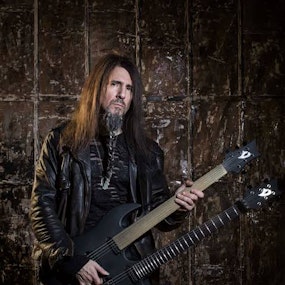
Ron "Bumblefoot" Thal
Ron 'Bumblefoot' Thal is an award-winning vocalist, songwriter, producer, and world-renowned guitar virtuoso, with over 30 years of releasing music, playing international festivals and headlining tours, and gracing magazine covers as a solo artist.
Lead guitarist of rock group Art Of Anarchy (2011 - present, formerly including STP/Velvet Revolver vocalist Scott Weiland, Creed vocalist Scott Stapp and Disturbed bassist John Moyer), Bumblefoot's band credits include lead singer and guitarist of the legendary progressive rock band Asia (with Geoff Downes, Carl Palmer and Billy Sherwood), and guitarist of progressive rock band Sons Of Apollo (with Mike Portnoy, Derek Sherinian, Billy Sheehan and Jeff Scott Soto.) As lead guitarist of Guns N' Roses (2006 - 2014), Bumblefoot toured sold-out shows all over the world, headlining festivals with crowds up to 150,000. Bumblefoot's unique 'fretless guitar' can be heard throughout Guns N' Roses' 2008 Chinese Democracy album.
The next Bumblefoot album is completed and being prepared for a 2024 release. The preceding Little Brother Is Watching album is an eccentric, upbeat collection of epic rock with haunting melodies, huge choruses and witty lyrics about life in the digital age and beyond. The album was composed, produced, recorded, mixed and mastered by Bumblefoot at his own studio, and includes a crowd of 100 fans stomping, chanting and singing backing vocals recorded at a listening party in New York. The album peaked at #4 on Amazon.com Rock charts globally.
Featured Episodes
Here are some great episodes to get started with


















